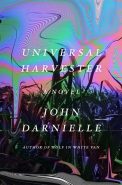
Book Review: Universal Harvester by John Darnielle
Reviewed by Adam Mills

Universal Harvester
A novel by John Darnielle
Farrar, Straus and Giroux, February 2017
$25.00; 224 pp.
ISBN-13: 978-0374282103
To get the easiest assessment out of the way: Universal Harvester is a complex, brooding, and insightful novel, and a strong improvement from John Darnielle’s debut Wolf in White Van, which itself was impressive overall. Where Wolf in White Van left a sense of a tightly controlled, air-locked static character study, intense yet strangely brittle, Universal Harvester’s narrative unfolds from its starting premise to an end destination, and destinations along the way, that few readers would anticipate from the beginning. Darnielle has a strong grasp for telling detail in communicating regional character and nicely establishes a sense of place for rural Iowa, such as in this moment where he describes what it’s like watching corn fields from your car while driving down the highway:
At sixty-five miles an hour, the cornfields flicker against the window like stock footage; shadows in between the rows pulse steadily in shades of yellow and green and early brown. There are as many bean fields now as corn, but nobody remembers those, their rows green and spiky and nearer to the ground. Corn, though: it hoists itself skyward all by itself, determinate, until the long green leaves on the stalks grow heavy and begin to droop in autumn. From the road it’s like a painting, a huge mural, endless, ongoing.
But, more importantly, he is sensitive and empathetic in his exploration of just about every character. What he ultimately accomplishes with this novel stands as a moving, honest exploration of what grief and loss do to us as human beings and the strange things that we sometimes do to reckon with our traumas.
Now, though, we must reckon with a strange thing about the novel: its marketing and presentation. Much of the press surrounding Universal Harvester, and even its own promotional materials, illustrate the novel as a horror story. Reviews and interviews from NPR, Tor.com, and Electric Literature bestow labels such as “creepy” and “unsettling” upon the book. Even the Library of Congress classification information on the backside of the title page identifies it plainly as “Horror fiction.” Generic classification and definition are twisty, ultimately fruitless rabbit holes which should be avoided when discussing books like Universal Harvester. Although it’s possible to read this novel as horror, it exists as such in a highly diluted and relative sense of the term. What this book deals with, to put it bluntly, is the horror of sorrow, not the horror of haunted corn fields or spooky videotapes.
Those who have been led to expect and genuinely anticipate this novel to fit that latter paradigm, of the literally haunted variety, may come away with a sense of being on the receiving end of a bait-and-switch. Readers who are inclined toward more straightforward literary realism may also find that some of Darnielle’s narrative choices estrange them from the story at times. Regardless, by the time they reach the end of this novel, readers will likely face a choice of having to either reject or accept that they are being given something radically different than what was promised, or what they initially imagined.
Nevertheless, readers who may be disappointed by this kind of scenario should still test their faith with Universal Harvester, because of the evident skill with which this story has been created and the deep, abiding empathy they will feel with the characters and the traumas that they all find themselves confronted with. For them, the horror of reality is more than enough to reckon with.
Adam Mills is a PhD student in creative writing at the University of Kansas. He has Masters Degrees from the Missouri State University and the Stonecoast Writing Program based out of the University of Southern Maine. Stories of his have appeared in FUSION, Ideomancer, and The Thackery T. Lambshead Cabinet of Curiosities. Adam also worked as Managing Editor for the webzine Weird Fiction Review Online from 2012 to 2014, during which time it was nominated for a World Fantasy Award. He previously served as Fiction Editor for Beecher’s Magazine, based out of KU’s graduate creative writing program.

I’m so glad I found my sotouiln online.